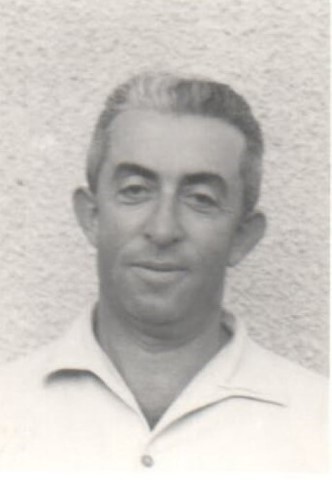Yitzhak Rozenberg was born in 1920 in Pohost-Zagorodzki, Polesia, eastern Poland. In his childhood, Yitzhak received a traditional Jewish education, studying from the age of 5 at a Talmud-Torah. At 7 he entered a Polish school, but continued to take lessons in religion from a private melamed. At the age of 12 he started commercial school in Pinsk, Polesia. In September 1939 Polish Polesia was occupied by the Soviets and, slightly later, most of it was included in the Soviet Republic of Belorussia. In June 1941, a few days before the attack of Nazi Germany on the Soviet Union, following a conflict with the new Soviet authorities, the Rozenberg family was deported to Siberia for "re-education." They were taken to a settlement of lumbermen in Western Siberia, where Yitzhak worked at tree felling.
Later, following the signing the Soviet-Polish agreement in August 1941, former Polish citizens were released from Soviet imprisonment. Thus, the Rozenberg family was permitted to leave Western Siberia for Soviet Central Asia. In October 1941, they arrived at the village of Gurlen, in the Khorezm Region of Uzbekistan, where the most of the family stayed until almost the end of the war.
In the spring of 1943, the Soviet authorities began mobilizing "Poles" into the newly formed 1st Kosciuszko Division. Five members of the Rozenberg family residing in Khorezm received call-ups for military service. Yitzhak, his brother Yosef, and three uncles went to the railway station of Divovo, east of Moscow, near which, in the Seltsy training camps, the division was formed. Unexpectedly, all five Rozenbergs were rejected. "In the enlistment office in Divovo we were received by a Polish officer, who arrogantly perused our papers and said dryly: 'If I enroll you, it will be a Jewish army; I already have more Jews here than Poles.' He dismissed us, saying: 'Go home','' 1 recalls Yitzhak Rozenberg. The way back was long and difficult.
Meanwhile, at the end of 1943, the Soviet authorities realized that the Rozenbergs were not only former Polish citizens, but currently Belorussian citizens; thus, its six men received new call-ups, this time to the Red Army. Subsequently, Yitzhak's uncle Aharon (born in 1903) was killed near Breslau, while Yitzhak, his Uncle Asher, and his cousin Moshe were wounded seriously in battles during the last year of the war. Only Yitzhak's brother Shmuel and his Uncle Moshe finished the war without serious injury.
The Rozenbergs started army service at a training base in Samarkand, Uzbekistan. From time to time Yitzhak sent requests to the authorities to send them to the front as soon as possible, but each time he received a refusal: they were "Westerners", i.e. came from territories recently annexed to the Soviet Union and, thus, considered, unreliable. Yitzhak wrote: "It made no sense that, despite the most acute need for manpower for the front and despite our being Jewish, the Red Army gave up tens of thousands of people who were strongly motivated to fight the Nazi enemy.'' 2 Therefore, the Rozenberg men spent almost a year at the training base. When the Rozenbergs were eventually sent to the frontline, Yitzhak fell ill with jaundice and ended up in a hospital. Thus, he arrived at the front even later than his relatives.
His first engagement in combat was during the Oder operation of the winter of 1945. His division arrived at the area of Stettin, but then turned southward. Yitzhak crossed the Oder River at Küstrin and proceeded to Berlin, which was only 50 kilometers away. During the capture of Berlin in April 1945, he was seriously wounded and spent the next six months in a military hospital in Gniezno, Poland.
In October 1945 Yitzhak was released from the Red Army. In 1946, he repatriated to Poland. In Opole, Silesia he joined kibbutz Dror, a group planning to immigrate to the Land of Israel. In mid-1946 Yitzhak and other members of this kibbutz crossed into Germany and, in 1947, they left for Israel but were intercepted by the British at sea. Yitzhak spent some time in a detention camp in Cyprus and arrived in Israel in 1948.
Yitzhak Rozenberg died in 2009.







